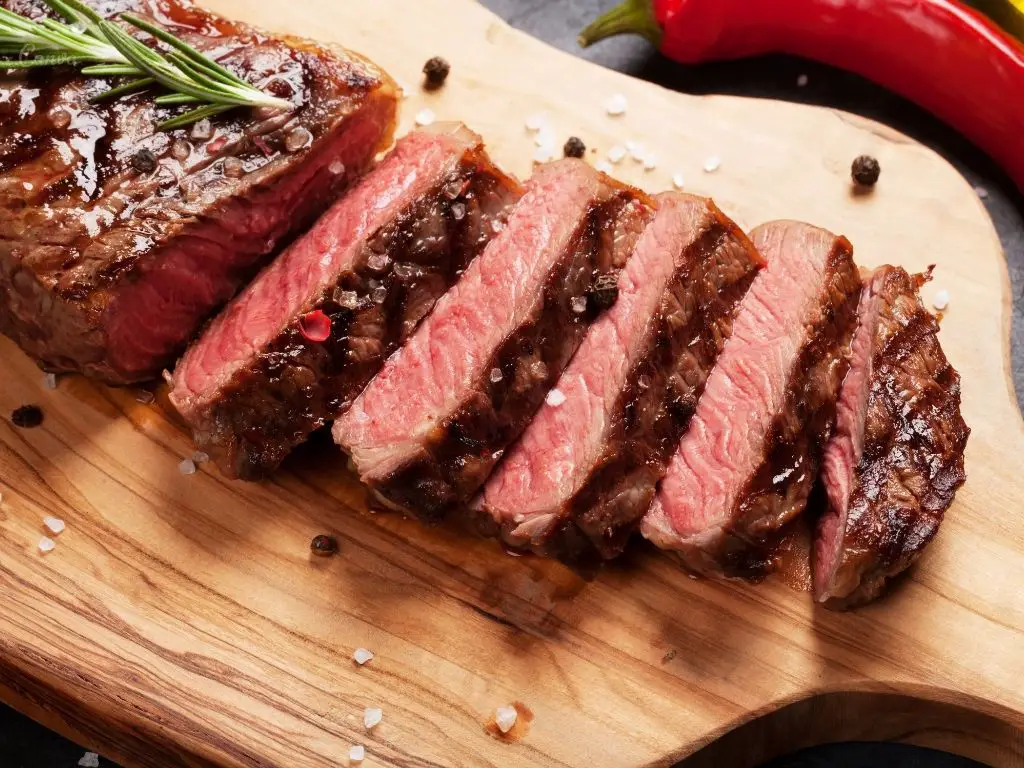Sous vide cooking has become an increasingly popular method for cooking steaks to perfection. The precision temperature control of sous vide allows you to achieve the ideal doneness for any cut of steak. However, some cuts are better suited for sous vide cooking than others. Here is an overview of the best cuts of steak to use for sous vide along with tips for cooking them.

Sous Vide Products I Use Every Day
As an Amazon affiliate, I earn from qualifying purchases.
Last update on 2024-10-04 / Affiliate links / Images from Amazon Product Advertising API
Best Cuts of Steak for Sous Vide Cooking
1. Filet Mignon (Tenderloin)
Filet mignon is one of the most popular cuts of steak to cook sous vide. The tenderloin comes from the short loin primal cut and contains very little connective tissue, making it naturally tender. Sous vide cooking allows you to achieve the perfect medium-rare doneness for filet mignon without the meat becoming tough or chewy. The consistently low temperature sous vide bath gently brings the center up to the target doneness while retaining moisture. Filet mignon is a lean cut, so be sure not to overcook it.
2. Ribeye Steak
Ribeye steak contains the characteristic rich marbling that makes it one of the most flavorful cuts of beef. It comes from the rib primal cut. The ample marbling on a ribeye steak keeps it moist and flavorful during extended sous vide cooking. The marbling also creates a delicious crust when seared after cooking. For best results, cook ribeyes sous vide until at least medium-rare doneness around 130-135°F to render the fat properly.
3. New York Strip (Striploin)
New York strip comes from the short loin primal and offers a perfect balance of tenderness and beefy flavor. It typically has a bit more marbling than filet mignon but less than ribeye. The moderate marbling and fat content of a NY strip steak allows it to remain juicy and tender when cooked sous vide. NY strip steaks do well with most sous vide temperatures from rare up to medium doneness.
4. Top Sirloin
Top sirloin offers great beef flavor at a more budget-friendly price. It comes from the sirloin primal cut near the tenderloin. Though not as naturally tender as premium steaks, top sirloin becomes meltingly tender when cooked sous vide. Keep the water bath temperature on the medium-rare side around 130°F. Slice thinly against the grain after cooking for maximum tenderness.
5. Porterhouse/T-Bone
This classic steakhouse steak contains both striploin and tenderloin sections. The differing thicknesses and fat contents of each section are evened out with sous vide cooking. Cook porterhouse or T-bone steaks to at least 135°F to ensure both cuts reach a perfect medium-rare doneness. The striploin section benefits the most from sous vide cooking.
6. Flank Steak
Flank steak comes from the belly primal cut and is naturally lean and thin. Traditional high-heat cooking can quickly make flank steak tough and chewy. However, sous vide flank steak comes out incredibly tender while still maintaining a dense, meaty texture. Cook flank steak sous vide on the rare side, around 125-130°F to prevent it from becoming dry. Slice thinly across the grain after cooking.
7. Skirt Steak
Similar to flank steak, skirt steak is a thin, flavorful cut that can easily dry out with high-heat cooking. It comes from the plate primal. Skirt steak cooked sous vide remains juicy and tender. For best results, marinate the meat before cooking and slice across the grain after cooking. Cook skirt steak sous vide to no more than medium doneness, around 135°F.
8. Hanger Steak
Hanger steak comes from the plate primal near the diaphragm and has lots of flavor. It used to be known as the “butcher’s steak” because butchers would keep it for themselves. Sous vide transforms the naturally tough hanger steak into a tender and juicy cut. Cook it sous vide to rare or medium-rare doneness, around 125-130°F to prevent the meat from becoming tough.
Tips for Sous Vide Cooking Steaks
Now that you know the best cuts of steak to use, here are some tips for preparing and cooking steaks sous vide for perfect results:
1. Seasoning and Marinades
Adding seasoning, herbs, and marinades before vacuum sealing steaks can really boost the flavor. Salt, cracked pepper, garlic, rosemary, thyme, and Worcestershire sauce all pair well with beef. Marinating tougher cuts like flank or hanger steak for at least an hour before cooking sous vide can further tenderize the meat.
2. Choosing the Right Temperature and Time
Refer to the sections above to find the ideal temperature for each cut of steak. In general, tender cuts only need 1-2 hours sous vide while tougher steaks benefit from 6-24 hours of cooking time to fully tenderize. It’s better to err on the side of less time to prevent the meat from becoming mushy.
3. Searing the Steak for a Perfect Finish
Quickly searing the steaks on very high heat after cooking sous vide creates a nice crust and enhances the flavor. Make sure to pat the steaks dry thoroughly before searing to get the best browning. Use a very hot skillet or grill and sear for just 1-2 minutes per side.
Conclusion: Experimenting with Sous Vide Cooking and Steak Cuts
One of the great benefits of sous vide cooking is how easy it makes experimenting with different cook times and temperatures. It’s much more forgiving than traditional high-heat methods. Try a thicker ribeye cooked longer at a lower temperature or a quick weeknight sirloin. With sous vide, you have the control to fine-tune each cut of steak to achieve the exact doneness, texture, and juiciness you desire. The possibilities are endless for creating steakhouse-quality steaks at home with sous vide.


![IMPRESA [10 pack] Sous Vide Magnets to Keep Bags Submerged & In Place - Sous Vide Accessories to Stop Floating Bags & Undercooking - Great Alternative to Sous Vide Weights, Balls, Clips, & Racks](https://m.media-amazon.com/images/I/41zHpl8G2lL._SL160_.jpg)

